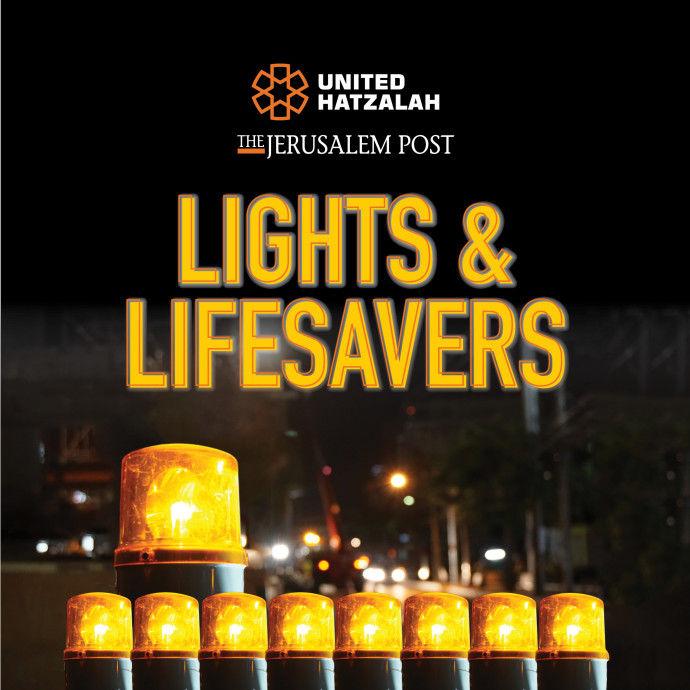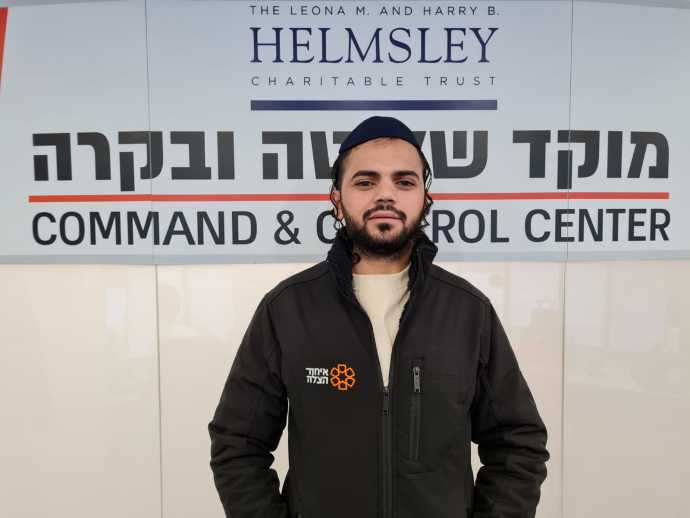On the night of Friday, October 6, Nachman Elbaz spent a relatively calm evening as the shift officer at United Hatzalah’s command and control center, along with a team of seven workers.
At 6:30 a.m., thirty minutes before his shift ended, the sirens sounded, and Hamas began its attacks on southern Israel. “I realized that it was more than the missile attacks that we were used to,” recalls the 28-year-old Elbaz, who also serves as the human resources manager of the center. “I didn’t panic.”

Once frantic distress calls began to come in from Israel’s south, he realized the gravity of the situation. Elbaz got on the special communications channel on United Hatzalah’s radio network used by administrators, managers, and branch heads, and organized a staging area at Tzomet Cheletz, north of Sderot, where the terrorists had not reached. He directed a special truck carrying essential medical supplies to the area and sent United Hatzalah personnel, ambulances, and helicopters there.
After administering initial treatment at Tzomet Cheletz, United Hatzalah medics transported the wounded to Soroka Medical Center in Beersheba, Barzilai Medical Center in Ashkelon, and Assuta Ashdod. “I had to make split-second decisions,” says Elbaz.

Elbaz ensured that the command-and-control center, which had been staffed by a small overnight team, quickly ramped up from seven workers to a crew of 50, smoothly receiving calls and assisting United Hatzalah staff in the field. “When the war began, I had to make sure that there was sufficient staff at all times,” he says. “I worked around the clock for the first week or two of the war.”
Due to the seriousness of the situation, Elbaz directed United Hatzalah personnel to transport the wounded in private cars rather than ambulances, which were in short supply. “We saved thousands of lives by using private vehicles,” he notes.
Despite their preparation, Elbaz and the staff at United Hatzalah never expected a day like October 7. As the day went on, Elbaz received calls from United Hatzalah medics reporting on the mounting death toll. “They would call and say, ‘We’ve found 20 more bodies,’ ‘We’ve found 40 more bodies.’ We had many conversations like this and didn’t know where we were holding.”
Elbaz singles out the United Hatzalah staff, who unhesitatingly entered cities and towns under attack and evacuated the wounded to Tzomet Cheletz. He remained in the command-and-control center until the early afternoon hours, took a short break, and then returned to work, staying calm despite the stress. “I realized that I needed to take everything I had learned and was trained to do,” he says.
During that day, Elbaz learned that a close friend who was serving at the IDF base in Sufa had been murdered. Despite the tragic news, Elbaz remained focused on his work. Only later, when he took a break, did he go into another room to cry and release his emotions.
“We are trained to do this work in the command-and-control center,” says Elbaz. “We know how to be sensitive to any call that comes in. There were some shocking, heartbreaking calls that came in that day, but our phone operators listened to everything. We don’t differentiate between race and religion. Everyone receives the proper treatment. We got through the situation, and we proved that we are one of the State of Israel’s essential organizations.”
The Jerusalem Post is proud to partner with United Hatzalah on the Lights and Lifesavers project to honor the October 7 massacre Heroes of Hanukkah. To support the country’s first responders, visit www.jpost.com/lifesavers2023

